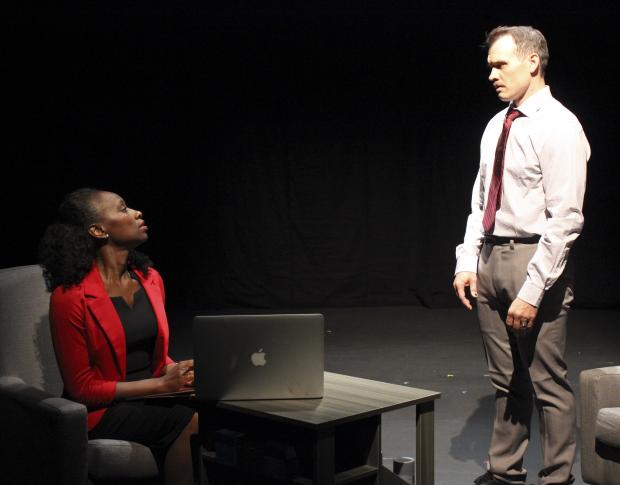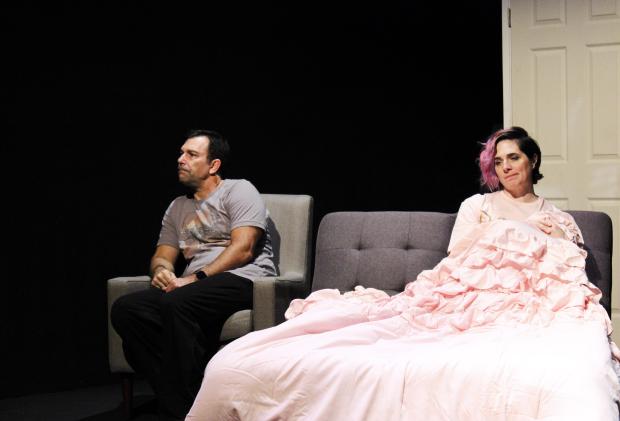Advertisement
Relationships are like apparel in that one size does not fit all. For centuries in American patriarchal society marriages were between one male and one female, and this heterosexual norm was widely expected to be the standard in premarital romances, too. Of course, just as the customary view as to whether straight people could have sex outside of marriage has shifted the entire notion of gender and more has radically changed over the years.
Enter writer/director Brian Reynolds, who tackles the notions of these altering societal norms by injecting how sexual partnerships and marriage are evolving into his subversive take on romantic comedy (complete with “cute meets”) in Mono/Poly. The title is clever as it refers to not only the real estate board game but to the idea that monogamy is a form of monopoly in the sense of ownership.
The conceit of this two-acter is that two straight married couples who are friends with each other encounter a threesome: Scott (Robert Mammana, an award winning actor with Broadway and TV credits), Bridget (Renata De Costa) and the imperious Victoria (Tanya Alexander), who, as her new indicates, rules like a queen. Hilarity is intended to ensue when the polyamorous pod becomes intertwined with the two up-until-then monogamous married couples.
The problem is that like those poly units on the Showtime series Polyamory: Married & Dating, the play’s trio - and I don’t know if Reynolds slyly intended this or not - are as hidebound by rules and regulations regarding who you can have sex with and so on as the “monos” (as they’re called in this wannabe comedy) are. Maybe even more so. The poly threesome are not the wild swingers in a triad where orgies and anything goes - anything but.
Not only that, although a sex toy is glimpsed and S&M is alluded to, there are no graphic onstage sex acts in Mono/Poly. And as for the thesps’ state of dress (and undress), voyeurs are able to see far more bare skin at the ’Bu on any summer day at the beach. So this isn’t nearly as daring a production as it might like to think (which, come to think of it, could be a point the playwright might be making about individuals who consider themselves to be sexually adventurous?)
Scott is pretentious, manipulative and one of those unbearable people who think they’re way cooler than they really are (and my completely wildly uninformed guess is, the playwriter’s snide alter ego?). Mammana mia! Victoria is extremely bossy and domineering and thus likewise obnoxious. But not only that, this character is problematic because being played by an African American actress Victoria seems to be derived from celluloid stereotypes. In particular, I am thinking of outspoken, assertive Black women who stridently proclaim their nationalist and militant stances to characters of different ethnicities and genders onscreen.
This variation of the “angry Black woman” trope goes at least as far back as the 1961 classic A Raisin in the Sun, with Walter Lee Younger’s (Sidney Poitier) Africa-centrist sister Beneatha Younger, played by Diana Sands. Other iterations of this image include Ketty Lester as Alma in Jules Dassin’s 1968 drama Uptight about Black revolutionaries; Cicely Tyson as Mattie Williams in 1976’s The River Niger; Vonetta McGee as the Angela Davis-like Paula Jones in 1977’s Brothers; and most recently, Laura Harrier as gun-toting Patrice Dumas in Spike Lee’s 2018 BlackkKlansman, who sports an Afro Angela and Kathleen Cleaver would kill whitey for.
However, in Mono/Poly, instead of ranting and raving about “Black Power” like her abovementioned filmic forebears, instead Victoria vents and holds forth about sexuality. To be fair, having said all this, Ms. Alexander does a juicy, excellent acting job as Queen Victoria, and she could give the Joans Crawford and Collins in their most dominating roles a run for their money. And, perhaps as a clue that the triad’s queen bee possesses a more whimsical side, Ms. Alexander wears the funniest slippers this reviewer has ever eyeballed treading on the boards. Kudos to Morgan MacDouglas, who has costume and prop design credits, for presumably unearthing this hilarious footwear. (However, being credited as Mono/Poly scenic designer, his set for the funky characters is, at best, merely functional.)
Surprisingly, despite its multi-culti cast, Mono/Poly never touches upon race. Rather than seeing the reason for this as being interracial sex is too sensitive a subject, I suspect it might be quite the opposite. That in 2019 urban USA, inter-ethnic mating and dating is common, if not passé. Indeed, all sorts of multi-cultural combinations are now regularly used to peddle products and services in TV commercials. That miscegenistic horse left the Guess Who’s Coming to Dinner and Jungle Fever barn long ago.
Rather, when the monos “transgress” bourgeois norms it is inter-gender hanky-panky that’s emphasized. Speaking of which, with her twists and turns, the married Henrietta as played by Angela Sauer demonstrates the production’s most range. The fact that this character uses the diminutive “Henri” is a clever tip off.
However, as the shrieking sexual teenybopper Krystal, Megan Gainey is merely annoying with her incessant screaming in the opening scene. There must be a way to play an irritating character on the stage or screen without the actor her- or himself being exasperating. This noise-o-phobic critic can’t stand banshees, even if they are nymphomaniacs.
Reynolds’ plot purports to focus on our sexual foibles and relationship fables, but this POV is unnecessarily cluttered and complicated by a storyline that involves a colossal conflict of economic interests. But maybe once again I am not giving the playwright enough credit. Perhaps this subplot is meant to allude to the High Renaissance of conflicts of interest we’re currently undergoing in the Trump and Biden eras. (BTW, I am still waiting to hear some sort of explanation as to exactly what Hunter Biden’s qualifications were and what he actually did to deserve a reported $50,000 per month from natural gas producer Burisma - that is, besides have the same last name as America’s vice president, who was involved in the Ukraine? Inquiring minds want to know.)
Monogamy is the romantic equivalent of private property under capitalism. What would love look like in a truly liberated world? Mono/Poly isn’t as outre and funny as it would like us to believe (or thinks itself to be), but it does raise some valid questions about marriage, relationships and bourgeois society’s assumptions and expectations. And Ms. Alexander’s outrageous slippers alone are almost worth the price of admission.
Tubeman Productions presents the world premiere of Mono/Poly plays on Thursdays - Saturdays at 8:00 p.m. and Sundays at 2:00 p.m. through Nov. 10, all at 8:00 p.m., at the Odyssey Theatre, 2055 S. Sepulveda Blvd., Los Angeles, CA 90025. For more info: (310)477-2055, ext. 2; http://monopolytheplay.com.
Ed Rampell is an L.A.-based film historian/reviewer and co-author of “The Hawaii Movie and Television Book”.




